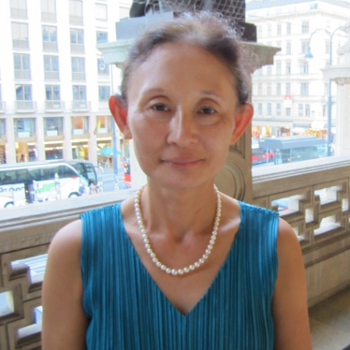Die Frau ohne Schatten is a fairy tale of two couples – celestial and earthen – in search of children and fulfilment. Clocking in at three and a half hours, with the usual cuts opened out here at the Wiener Staatsoper, the performance could be a slog, especially for those unfamiliar with its complex musical structure. But it can be, as was the case on this memorable evening, an unforgettable experience that leaves one shattered in its quiet conclusion, with one’s faith in humanity restored, however briefly. Christian Thielemann and the Orchestra of the Vienna State Opera, along with an ensemble of excellent singers, achieved the rare feat of a magnificent performance of Strauss' masterpiece.
Vincent Huguet's 2019 production places the drama in an unspecified period vaguely suggesting the time of the opera’s conception, the First World War. A single unifying set consisting of tall grey slabs of varying heights serves as backdrop. The stage is otherwise bare except for a mid-air structure resembling a bird cage in the opening scene. The Nurse, Emperor and Empress appear in succession from this palace or bedroom, as Keikobad's Messenger joins from a passage leading to the outer world. It is arresting, the only striking image in an otherwise dull and colourless staging. Huguet is more successful in creating distinct characters with their motivations and feelings well coordinated with their singing. Their interactions are often touching, especially between the Empress and Barak the Dyer. There is a hint of strong attraction, which is instrumental to the Empress’s transformation. The “woman without a shadow” becomes human by loving a humble man.
Strauss wrote fiendishly difficult music for voices and it is a rare pleasure to experience singers with the requisite techniques, as well as the artistry, to sing their challenging roles with seeming ease and mastery. Strauss clearly did not care much about tenors; Andreas Schager struggled with the tessitura of the Emperor, and his lack of legato was pronounced at times. His voice still shone with radiance and power, however. As the Empress, Elza van den Heever had little difficulty with conveying the celestial being’s initial naïveté, subsequent bewilderment and, finally, wisdom, all with her clear, penetrating tone. Her voice’s evenness throughout the registers was a delight, while her outburst of Singspiel in Act 3 was thrilling and moving.
Tanja Ariane Baumgartner accomplished the rare feat of singing the scheming Nurse’s lengthy entreaties and cajoling with steadiness and a hint of vulnerability, arousing our sympathy for her final vanquishment. As Keikobad's Messenger, Clemens Unterreiner was a worthy complement to the drama with his reliably secure and booming baritone.
Michael Volle, one of the most versatile and exciting baritone singers of our time, embodied the sympathetic character of Barak, the long-suffering working class husband and provider, with masterful versatility in his performance. His voice is flexible in tone and colour, expressing the Dyer’s compassion, sadness and endurance with astonishing clarity. Volle’s vocal and physical dominance anchored his every scene, and he was convincing as the man that every woman, Empress or common wife, should fall in love with. Equally impressive was Elena Pankratova as Barak’s unwilling and bitter wife who learns to become a loving wife by the end of her journey. Panktravota’s voice, warm, round and steady, soared to the heights with ease and beauty, and she presented the character’s shifting moods and emotions with delightful colours, musicality and nuance. The scenes between Volle and Pankratova, where they often seemed to be conversing as a couple to negotiate their relationship rather than singing at one another, were especially memorable.
The evening, however, belonged to Thielemann at the helm of one of the best orchestras in the world. Yes, this evening his tempi were often slow and perhaps his dynamics were at times a little loud to challenge the singers, but what a world of sonic pleasure he created! Every note was carefully and clearly considered and articulated, from the first distinct chord to the final silence. One recognises the sonata structure of the three acts, with the first and third acts starting with dark foreboding and ending with sublime quietude, while the second act develops and creates chaos. Every musician, starting with the two excellent lead violinists and the cellist with his exposed solo to the glass harmonica player who makes well-timed entrances towards the end, was absolutely committed to Thielemann’s vision to give a coherent and unified account of the opera as an organic whole, not beautiful melodies here and thundering noises there. Woodwinds chirped and danced, the brass were often understated but sonorous, and as many as six percussionists realised Strauss’s unique orchestration to perfection.




